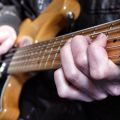Electric vs. Acoustic Guitar at Home

This is a broad question that goes beyond whether or not you want to play at home, but you should still consider the question. Of course, they both have their advantages and disadvantages, and really it comes down to how you prefer to play. What is your playing style?
By itself, an electric guitar makes a minimal amount of noise compared to the acoustic variety. You can simply plug it into a headphone jack (which can be found on your amp), or through your computer via the audio interface. With this setup, you will be able to play to your heart's content without anyone else hearing you. You also have more choices for the tone of your music - from classic rock to indie pop.
When you play an acoustic guitar, you produce a beautiful sound without the need for any extra gear (pedals, amps, etc.). But the main drawback is that there's no way to "turn down" the sound it makes without changing your playing style or velocity, which might be a problem if you're living in close quarters with others who don't wish to be disturbed.
However, if saving space and affordability are more important than an acoustic guitar may still be a better option for you.
A key difference between playing at home and playing on a stage is volume. Your performance will almost always sound better with more volume, such as when it's recorded on a live stage. However, if you're practicing guitar at home during COVID-19, you likely won't have that luxury of having more volume when you have neighbors, family, roommates, etc.
So How Can You Have a Quiet but Still Satisfying Practice Session at Home?
The answer is simple: play an electric guitar. Maybe not the answer you wanted to hear, but it's still the answer. After all, you can simply just plug in your electric guitar and play while listening on headphones - it doesn't get simpler than that.
A good tip is to use a smaller amp - these will generally produce less volume. Even better if you use an amp with a headphone output. They also come in different varieties, and some have an aux-in that will let you play your own backing tracks.
You can also practice playing electric guitar with plugins through an audio interface. This way, you can easily get your guitar hooked up to your computer. You can use any available audio interface - there are lots of affordable or even free options for digital audio workstations and recording software (DAWs). Good places to start are Amplitude and Guitar rig.
And finally, you'll want to utilize an attenuator. This device will reduce unnecessary power expenditure coming from the amp, thus reducing the volume without worsening your tone. If you've got a value amp, all the better. You'll be able to enjoy an awesome tone without making a racket in your household.
Conclusion
If you want to practice quietly at home while being able to maintain tonal flexibility, then an electric guitar is the best option. If you have the luxury of making more noise, and you want a more affordable and practical option with great sound, then acoustic guitar can work great for you.
Other articles and publications:
- +1 (913) 562-4112
- 7465 W 161st St, Overland Park, KS 66085
- www.musichouseschool.com


